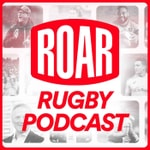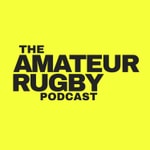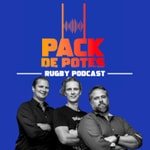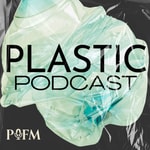RugbyKO – Details, episodes & analysis
Podcast details
Technical and general information from the podcast's RSS feed.
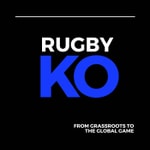
RugbyKO
Katrina Oxenham
Frequency: 1 episode/16d. Total Eps: 42

Recent rankings
Latest chart positions across Apple Podcasts and Spotify rankings.
Apple Podcasts
🇩🇪 Germany - rugby
24/02/2025#99🇩🇪 Germany - rugby
23/02/2025#99🇩🇪 Germany - rugby
22/02/2025#100🇩🇪 Germany - rugby
21/02/2025#99🇩🇪 Germany - rugby
20/02/2025#97🇩🇪 Germany - rugby
19/02/2025#97🇩🇪 Germany - rugby
18/02/2025#97🇩🇪 Germany - rugby
17/02/2025#97🇩🇪 Germany - rugby
16/02/2025#96🇩🇪 Germany - rugby
15/02/2025#97
Spotify
No recent rankings available
Shared links between episodes and podcasts
Links found in episode descriptions and other podcasts that share them.
See all- https://twitter.com/SamWykes4
4 shares
- https://twitter.com/marktonga
3 shares
- https://twitter.com/gmumm1
2 shares
RSS feed quality and score
Technical evaluation of the podcast's RSS feed quality and structure.
See allScore global : 68%
Publication history
Monthly episode publishing history over the past years.
Bula Drua
Season 2 · Episode 12
vendredi 25 mars 2022 • Duration 31:47
Mick Byrne is the head coach of the Fijian Drua. Hear how Mick made the transition from playing AFL to rugby, to AFL coach, rugby assistant coach, and now Head Coach of the new franchise in the Super Rugby competition, the Fiji Drua. We dive into the lessons Mick has learned over his extensive career, and why he chose to enroll in a psychology course to address his own ideas when his coaching wasn’t being acted on. Find out what differentiates a great coach from a good one, and why team culture and giving everyone a voice is so key in maintaining the relationship between assistant and head coach when challenges arise. Listen in to hear why Fijian players are so passionate, what this means for their game, and how the inclusion of two pacific island teams into Super rugby is helping prevent the skills drain to offshore teams. We wrap up with Mick’s hopes and goals for the Fijian Drua, and what you can expect from them going forward.
- An introduction to Mick Byrne, head coach of the Fijian Drua.
- How Mick landed the job after his roles as head coach in Australian Rules and assistant rugby coach.
- Why Mick made the switch from AFL to rugby and his journey from player to coach.
- What differentiates the good coaches from the great coaches like Mick: different approaches to discipline and Mick’s enrolment in a psychology course.
- Being the assistant coach at the Wallabies and the All Blacks, and what Mick learned about the game of rugby in the country.
- How Mick coped with agitation and disagreements with the head coach: creating a unified team culture.
- Why rugby in Fiji has become part of the fabric of the nation and why so many are passionate players and also fans of the team and the game.
- What the pacific island teams are bringing to the Super Rugby franchise.
- Managing coaching the Fijian Drua through the COVID-19 pandemic; the pros and cons.
- How the induction of the Fijian Drua into Super rugby is addressing the loss of local players to offshore teams.
- The coaching staff involved in the Fijian Drua.
- How World Rugby is supporting the Fijian Drua.
- Mick's advice to other coaches and what he's learned throughout his career.
- Sticking it out when the team turns on you: Mick’s suggestions on building a good environment.
- Why the Fijian Sevens' success hasn't translated to Fijian 15-a-side.
- Mick’s plans for the Fijian Drua going into the next phase of the season.
- The Fijian Drua’s chances in the Super Rugby pool, and their goals.
“I actually started to really enjoy the Aussie rules game. Running around fit my build. I was able to do a lot more in Australian Rules football with my build than I was able to do in rugby.” — Mick Byrne [0:02:24]
“My message wasn’t getting through. I still believe I was giving out good information, but it wasn’t being heard, it wasn’t being acted on. Something had to change: either I was going to have to give coaching away and get a real job, or I was going to have to work on myself.” — Mick Byrne [0:05:28]
“When it came to rugby, [Fijians] play the good parts of rugby. They don’t get caught up in the aspects of the game that are a bit stifling, they like to play the fun parts of the game.” — Mick Byrne [0:10:30]
Links Mentioned in Today’s Episode:
The 'Mic' Likes Wykes
Season 2 · Episode 11
vendredi 11 mars 2022 • Duration 28:02
After his very recent retirement from playing Rugby, like many players, life after professional rugby can be difficult. Sam Wykes’ experience was no different at first.
However, with some determined resolve, he has created a wealth of opportunities for himself, from commentating to coaching and even corporate recruitment.
We hear what Sam’s transition from the life of a professional athlete to a desk job has been like, and how he has continued to give back to the rugby community.
We find out how COVID-19 and injury combined to spell the end of his career, and how he handled the difficult emotions surrounding this.
Sam also talks to us about his exciting new role and experience as a commentator for the Fijian Drua and some of the challenges he's faced, and what he is looking forward to this Super Rugby season.
We reminisce over his time at the Western Force and the Waratahs, and how the culture differs between these two teams.
- Welcome to Sam Wykes, professional rugby player, commentator, and recruiter.
- What Sam enjoyed most about playing professional rugby, and what he’s going to miss most.
- The lessons learned from transitioning from playing sport for a living into the corporate world: don’t expect to be good from the start, and adjusting to the office environment.
- Sam’s experience playing in Japan, from living there to learning from some of the best rugby minds in the world.
- What Sam thinks the Fijian Drua will bring to Super Rugby.
- Where to hear Sam commentating.
- The training he has received to prepare him for commentating, and the technical challenges that he faced.
- Moving from the Western Force to the Waratahs and the differences Sam noticed between the two teams.
- What Sam did during his time off due to injury, and the importance of giving back to the sport at the grassroots level.
- The connections and social skills that will help grow the game, and getting the game back to where it was.
- Skills that Sam transferred from rugby to working in recruitment (not computer skills).
- The importance of having tough conversations, from rugby to the corporate world.
“You’re surrounded by good people, a lot. Whether you’re in a winning team or a losing team it doesn’t matter. And any time I treated rugby like a job, I was unhappy. Because at the end of the day you’re supposed to enjoy it.” — @SamWykes4 [0:01:24]
“I always say ‘Yes’ to opportunities, even if I’ve got no experience, or probably no right being there.” — @SamWykes4 [0:11:21]
“We need all our teams firing at the moment to have a strong Wallabies team. There’s enough talent out there. I just think we’re neglecting the grassroots or the public school system to be able to get rugby playing again.” — @SamWykes4 [0:17:33]
“What I did is what I normally do, is just see if I can be of service to someone else. There’s always someone worse off than you, and there’s always someone better off than you. So, you just need to stay grateful.” — @SamWykes4 [0:19:28]
Links Mentioned in Today’s Episode:
Andrew Lockwood - The Andy Army
Season 2 · Episode 3
vendredi 28 mai 2021 • Duration 34:30
Andy Lockwood grew up in PNG and the UK. In 1999 he travelled to Perth to play some rugby and managed to get selected for the WA U19s.
On return to the UK he attended University before starting a career in the British Army. Rugby playing was put on hold for various periods as deployments to Iraq and Afghanistan were on the cards.
In 2015 Andy started a part-time internship at Bath Rugby Academy within the Performance team. At the end of the internship in 2018 he was left with no involvement in rugby after 30 years in the game as a player and coach. This motivated him to start The Rugby Outreach Project and Rugby Vacancies.
The Rugby Outreach Project provides free fitness and Strength & Conditioning advice to teams around the world. From international to grassroots level. 170+ teams have been assisted over the last three years.
Rugby Vacancies connects coaches and rugby people to jobs around the globe. He has previously assisted the Crusaders and Fiji with their coach recruitment.
We talk about these exciting ventures in Rugby and their ongoing success, as well as his recruitment of rugby players into the WWE, world of wrestling. We discuss his 17 years in the British Army, and his thoughts on the game of rugby in Northern Hemisphere.
Rugby Vacancies
https://www.facebook.com/rugbyvacancies/
Rugby Outreach Project
https://www.facebook.com/rugbyoutreach/
Andrew Lockwood @ LinkedIN
https://www.linkedin.com/in/andrew-lockwood-18a14864/?originalSubdomain=uk
Dr Adrian Cohen - Cohen, Concussion and the Chek
Season 2 · Episode 2
vendredi 23 avril 2021 • Duration 45:35
Your mission with head safe and neck safe is ultimately to eliminate or reduce preventable neck and head injuries. Do you have any current information specific to sport in Australia around the number of head and neck injuries occurring in sport each year.
What can we do to prevent this or reduce this number? Concussion is of particular concern, even in junior sport. What can be done more actively to reduce the occurrence of this and what are the effects of experience a single concussion, and multiple concussions?
There is some litigious discussions currently with the English Rugby Union and Welsh Rugby Union in the form of a class action, taking World Rugby to task for not providing adequate player welfare and a safe playing environment for players. Some high profile ex players are saying that long term brain injuries have been endured as a direct consequence of head or neck injuries sustained while playing rugby. What are your thoughts on this and have we globally provided a safer playing environment now?
Do measures such as Head injury Assessments HIA or the implementation of the Blue Card for example - indicating that a match official would like the player assessed for concussion or a potential head injury - do you think these measures are adequate and a step forward, or is there further to go to ensure player welfare in this combative sport.
There is a Gradual Return to Play protocol in Rugby Union, where anyone who has been confirmed medically as suffering a concussion must under specific guidelines for specific players, gradually return to full play following the injury. Can you tell us what is the required time for the injury to be deemed now safe to play again?
Is there a standardised treatment, analysis and recommendations for head or neck injuries across the board for all community rugby union and then also for all professional rugby union? Should there be a unified approach?
Is there a potential litigious situation for Australian Rugby Union in relation to providing a duty of care to players? What needs to be done immediately to avoid a litigious situation, but more importantly, to mitigate these risks and provide the safe environment needed and provide the highest level of care for all players?
Could you talk to us about NuroChek and its application in assessing brain function. I understand the FDA in the USA has adopted this technology, but it is not yet approved in Australia. Does this enhance the more precise diagnosis of a head injury, taking the subjectiveness out of it?
You have also introduced a training accreditation process for first responders to be trained in how to manage head and neck injuries correctly. Can you tell us about this accreditation process and can other first aiders in general do this course if they wish to be able to be informed and mange these injuries until more qualified expert attention can be given?
You did some high level studies with players at Randwick rugby, measuring the force of impact, the frequency of impact and gathered much needed facts and data. What were the findings in general from that study?
Do you think this is a new problem and is it related to the pace and ferocity of the game and the way it is played now? Or, has concussion and related head and neck injuries always been prevalent in all full contact sports?
You have also provided medical teams to film sets and TV shows, such as Survivor, The Biggest Loser and others. Do you have any stories you can share where these medical teams were critical?
You are at the fore front of this important medical science. What do you need to ensure this important work is implemented, recognised so that globally we reduce and prevent head and neck injuries of players?
NUROCHEK
HEADSAFE
NECKSAFE
DR ADRIAN COHEN
Will Grant - Grassroots Gun S2 Ep 1
Season 2 · Episode 1
dimanche 18 avril 2021 • Duration 23:03
Will Grant lives in Rouchel (pronounced 'Roo Kill' he tells me) - a small town in the Upper Hunter, and was introduced to Rugby Union when he started as a boarder at the Kings School in Sydney. He played his junior rugby as a rugby league player in the surrounding league competitions offered near his rural home. In his senior high school years, Will moved to Riverview College where he played in the first XV for two years and cemented his love of union.
Following school , he headed to New Zealand and was signed to the provincial competition, the Mitre 10 Cup competition, playing for Northland. It is the second highest level of competition in NZ and Will is returning to NZ for the next season, leaving his beloved farming life again in Australia.
Will talks about growing up in very rural and isolated NSW and playing rugby league asa youngster, with dreams of becoming a wests tigers player, his beloved team.
He was introduced to Rugby Union when he attended boarding school in Sydney, and did not look back. Following school, he spread his wings and ventured to New Zealand, where he was picked up by the provincial club, Northland in the Mitre 10 Cup.
Will talks about his development as a player and person in New Zealand and how the rugby experience across the ditch has been invaluable in his understanding of the game and application of his rugby skills.
He is back in Australia on the farm, but talks about how keen he is to get back to NZ and play, following a Covid enforced break, with aspirations of playing in a Super Rugby team, the next step for him in his career.
We talk about his desire to play for the Wallabies, and how he will need tor eturn to play domestically if he wants to achieve that goal.
We talk about the positive culture in NZ and the love of Rugby there, and the off field community feel to the game in the very successful rugby nation. We talk about the differences on the field with the way the game is played there, and what Will has learnt from many notable players he has had the opportunity to be exposed to and involved with in his time there.
We discuss how he was heavily influenced by Rugby league at a young age as rugby union did not have the same presence in the bush, and we talk about the lack of opportunity for country kids to immerse themselves in union due to the lack of nearby competitions.
Will talks about the future, heading back to NZ, and how he has appreciated the huge rainfalls we have been experiencing which is helping farm life. He hopes to get Upper Rouchel in the spotlight one day when he pulls on the green and gold jersey and plays for the Wallabies.
Upper Rouchel
Scone
Mitre 10 Cup
NZ Rugby
Super Rugby
Upper Hunter
Riverview College
The King's School
Dane Inman
Northland Taniwha
Hora Hora
Whangarei
Nick Piper - The Piper Production
Season 2 · Episode 1
mercredi 7 avril 2021 • Duration 40:25
In the first episode of the 2021 season of Rugby KO, we talk to the talented Nick Piper, owner and producer of Onion TV. His prolific sports documentaries have a combined almost one million views and he is now into the 7th series of The Season, his Rugby Union documentary series. He takes a close look at schools Rugby, and provides access to the inner sanctum of what makes a schools rugby team so entertaining.
Nick talks about his devotion to sport and profiling all sports, including Rowing, Rugby, Basketball, Netball, Baseball amongst others and what are the key ingredients into producing reputable, high quality sports documentaries.
We discuss the name Onion TV and Nick provides interesting insights into why the company was named Onion, including the layers involved, standing out from a crowded and contrived production cohort , and that when you watch Onion TV you may just shed a tear or two with the intensity of the documentaries and the sporting highs and lows experienced.
Nick talks about some integral components to providing great content and a production that achieves the goals intended, including the importance of the audio insights, the microphone always on, cinematography and the tricks of the trade in capturing the best position for videoing. The detail in post production and the requirements to align with the ethos of schools in particular in generating a final product that is not only highly entertaining, but keeps to the professionalism, the spirit captured and honours the subjects in question.
He shares a story about launching the documentary and how fortunate he was in the game he produced in Queensland between Nudgee College vs Gregory Terrace. The match could not have been scripted better, with a packed school stadium of 12,000 spectators, a tied game, controversy over a final kick, and then the unbelievable applause and adulation of the emotional crowd. It launched his series and was the perfect rugby match that had it all for engaging an audience.
We talk about what in fact makes a great sports documentary, the rise of the category over the last 10 years, and what it takes to present the best possible content and viewing for a demographic that wants highlights and shorter excerpts of matches and regularly able to have access to it. We discuss how the landscape for media and sport in particular has changed.
Nick discusses his preliminary conversations with Stan and Nine Entertainment and the exciting future for Onion TV. He talks about his vision for the company, both short and long term and what he is planning immediately to take Onion TV and sports documentaries to the next level.
Watch his series on Rugby Pass, You Tube or the Onion TV website and see what we are talking about.
Episode Links
Nick Piper
www.oniontv.com.au
The Season
The Crew
The Code
Nudgee College
Gregory Terrace
Hamilton Boys College
Brisbane Boys College
The Brumbies
The Waratahs
Reesjan Pasitoa
Rugby Pass
Fox Sports
Stan Sport
Nine Entertainment
Mumbrella Awards
Loughborough University
The Big Breakfast UK
The Haka
Matt Taylor - Tackling Defence
Season 1 · Episode 20
lundi 16 novembre 2020 • Duration 29:08
From knowing your opponent’s key stats to studying their star players, preparing your team’s defence is as vital as their offence game. Today we speak with Wallabies defence coach Matt Taylor about his life, career, and what he does to develop a dogged defensive line. After touching on his professional highlights, we chat about his time coaching in Scotland and how he landed his job at the Wallabies. From there, we discuss his relationship with attack coach Scott Wisemantel and coach David Rennie. Matt shares insights into his defensive plan, what information he uses to develop his strategy, and which aspects of the Wallabies’ performance he aims to improve. We unpack how Matt adapts his plans on the pitch before we dive into his team’s coaching structure. As head coach David Rennie is a New Zealander, we ask Matt whether coach nationality impacts player patriotism and pride in wearing the jersey. Matt’s answer emphasises the importance of culture fit over nationality, along with why he believes David Rennie is the perfect coach for the job. Near the end of the episode, we explore the Wallabies role in reaching the grassroots game and how they are restoring faith in Australian rugby. Tune in to learn more about what Matt is doing to bring confidence back in the defensive aspects of the Wallabies.
• Introducing Wallabies defence coach Matt Taylor.
• Exploring Matt’s experience coaching in Scotland.
• Hear about Matt’s current work at the Wallabies.
• Insights into Matt’s strategies for developing a team’s defensive capabilities.
• Why head coaches need to recognise the importance of a side’s defence.
• Which defensive areas the Wallabies need to improve.
• The stats that defensive coaches use to formulate their defence plans.
• How players adapt their defence plan during a game.
• Why the Wallabies have brought more young guns into the team.
• We discuss the Wallaby coaching structure and team.
• Whether nationality impacts the ability to instil patriotic pride in wearing the jersey.
• Matt shares his opinions on why David Rennie is the ideal Wallabies head coach.
• How the pandemic has affected the Wallabies' plans to connect with the grassroots.
• Winning fanbase and restoring confidence in Australian rugby.
“As a defensive coach, you have to study your opponent’s attacking stats, their star players, their speed of ball, what phases they score their tries in — it’s a big melting pot.” — Matt Taylor [0:12:04]
“One thing that’s impressive about David Rennie is he’s not afraid to give the young guys a go.” — Matt Taylor [0:17:01]
“As long as you understand the culture, your coach’s nationality doesn’t matter. There wasn’t an Australian coach that could have taken the role of Wallabies coach as well as David Rennie.” — Matt Taylor [0:21:54]
Matt Taylor
Curtis Bradford - The Austrian Advantage
Season 1 · Episode 19
lundi 16 novembre 2020 • Duration 26:00
With so many styles of play on offer, adaptability has become a necessary skill for the international and modern rugby coach. Today we speak with Curtis Bradford, one of the youngest national coaches in World Rugby, whose career has taken him to Malaysia, Wales, Finland, Rwanda, and Austria. After sharing his professional highlights, we chat with Curtis about his current role as the Head Coach of the Austrian Sevens team. Curtis provides insights into what rugby is like in a smaller nation, diving into their focus on player retention, the sports that rugby competes with, and what Austrian rugby is doing to ensure that each generation of players performs better than the last. We also touch on the state of Austrian women’s rugby before Curtis reflects on his experiences as a globe-trotting coach. Following this, we discuss the importance of adaptability to rugby coaching. Near the end of the episode, we explore Curtis’s work for the Friends of Rwanda charity. Tune in to hear more game-changing perspectives on coaching from Curtis Bradford.
Key Points From This Episode:
• Introducing Curtis Bradford, the world’s youngest national rugby coach.
• Hear about how Austria is faring under the pandemic.
• What led Curtis to find and then accept his Austrian coaching appointment.
• Curtis shares details about what the Australian club rugby scene is like.
• How Austrian rugby retains its players through high-quality programs.
• Exploring the opportunities presented by rugby’s international profile.
• Why Curtis’s priority as an Austrian coach isn’t to win titles.
• Why the successes of Austria’s coaching approach will first be seen in sevens rugby.
• Discussing the state of women’s rugby in Austria.
• How rugby fits into Austria’s sports landscape.
• Curtis talks about the top experiences from his globe-trotting career.
• The importance of adaptability when coaching such an international game.
• We touch on Curtis’s work for the Friends of Rwanda charity.
“In Austria, we’re focusing on player retention. The best way is to make sessions as high-quality as possible and to develop players as quickly as we can.” — Curtis Bradford [0:08:16]
“What we’re trying to do is to lay the platforms for the next group to come through. We aim to set up good pathways and leave the jersey in a better place than we found it.” — Curtis Bradford [0:13:12]
How I speak to players in Byron Bay is completely different to how I speak to Malaysian players. With such an international game, you have to be adaptable in your approach.” — Curtis Bradford [0:22:13]
Links Mentioned in Today’s Episode:
Tim Wallace - Time to Soar for Shore
Season 1 · Episode 18
lundi 9 novembre 2020 • Duration 32:34
High-calibre play and healthy interschool rivalries make school rugby a key battleground for developing the next generation players. Today we speak with ex-Wallaby Tim Wallace about school rugby and his work in rugby development at the Shore School in Sydney. We open our conversation by discussing Tim’s career highlights in club and international rugby. After sharing his tips on competing for team spots, we talk about the link between effective school level coaching and building a rapport with your students. Tim then opens up about the challenges faced by Shore School rugby and the solutions they’re introducing to boost their level of play. We touch on the importance of school competition, how school rugby creates a pathway to professional rugby, and Tim’s views on other codes of football. He emphasises that the sport provides students with mentors and role models — irrespective of the code they play. Near the end of the episode, we reflect on why many students stop playing after leaving school, with personal insights into what helped Tim continue his rugby career. We round off our conversation by chatting about the Shore School’s 2021 goals. Tune in for more on how Tim is determined to take school rugby at Shore into a successful new era for the school.
Key Points From This Episode:
• Comparing the experience of playing school, club, and international rugby.
• Tim shares his fondness for old school rugby tours.
• Advice on perseverance and competing over the same player position.
• Hear about Tim’s work at the Shore School in Sydney.
• Why the Shore School hasn't been able to land a rugby title in recent years.
• What the Shore School is doing to boost their level of play.
• The importance of strong school rugby rivalries.
• How school rugby provides a pathway to the professional game.
• How pride in the school, the jersey, and playing the first XV is inherent at the school.
• Tim discusses the factors that kept him playing after leaving school, but why others don't.
• Insights into coaching resources provided by Rugby Australia and GPS schools.
• Tim opens up about the 2021 goals that he has for his team.
“Old boys are proud to watch their school play. It becomes a breeding ground for professional athletes.” — Tim Wallace [0:16:53]
“For younger boys, if they have good role models, it doesn’t matter if they’re playing rugby union, league or AFL. They’re getting a good example of who they can aspire to be.” — Tim Wallace [0:19:37]
Links Mentioned in Today’s Episode:
Toutai Kefu - An Overview with Kefu
Season 1 · Episode 17
jeudi 29 octobre 2020 • Duration 19:13
For many, rugby has been an incredible outlet where people have found friendship and camaraderie. For Toutai Kefu — arguably the best number 8 that the Wallabies have ever had, transitioning into coaching was a natural step that allowed him to stay connected to the culture that he loves.
Today we speak to Toutai about his career as an illustrious player and prolific coach. Early in our conversation, we chat about his love of coaching and the years he spent in Japan. Touching on his current role as a coach for the World Ten Series, we talk about the 10s format and how its focus on set pieces might attract rugby traditionalists. Following this, we discuss his work at Brisbane Boys’ College, what it’s like to work with his brother, Steve, changes to the Wallabies’ culture, and why forming a Pacific island rugby team is an opportunity to inject excitement into Super Rugby.
After sharing his take that Rugby Australia could have better handled the controversy surrounding Israel Folau, Toutai dives into what he would do if he was in charge of Rugby Australia. With an international career spanning many areas of the game,
tune in to hear more insights from Toutai Kefu, the multi-faceted Tongan talent.
Key Points From This Episode:
• Introducing ex-Wallaby and prolific coach, Toutai Kefu.
• Toutai shares details about his career highlights as a player.
• Living in Japan and what their rugby following looks like.
• Hear what Toutai loves about coaching and how it keeps him connected to the sport.
• Comparing 10s rugby with other formats and why it might appeal to traditionalists.
• What it was like for Toutai to coach Brisbane Boys’ College with his brother.
• How Toutai would coach the Wallabies scrum if he were in charge.
• Why Toutai thinks that a Super Rugby Pacific island team is an incredible idea.
• Courting controversy; why Rugby Australia could have better handled the Israel Folau case.
• Repairing the Australian rugby’s relationship with the grassroots game.
“One of the biggest things that I love about rugby is that camaraderie and friendship. Being a
coach keeps you in that fantastic environment.” — Toutai Kefu [0:05:08]
“Everyone thinks that there will be cultural challenges with creating a Pacific island team but we all get along. We’re all Pacific brothers and we all know that.” — Toutai Kefu [0:13:25]
Links Mentioned in Today’s Episode:
Toutai Kefu
Tonga National Team
Brisbane Boys’ College
Queensland Country
Kubota Spears
Queensland Reds
World Tens Series
The Season
Steve Kefu
Rod Macqueen
Taniela Tupou
Super Rugby
National Rugby Championship
Rugby Australia
Israel Folau
Qantas
RugbyKO

